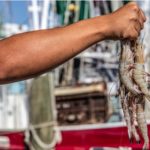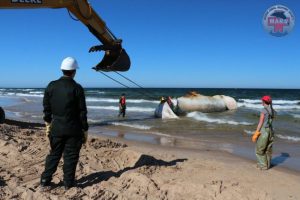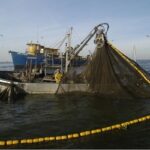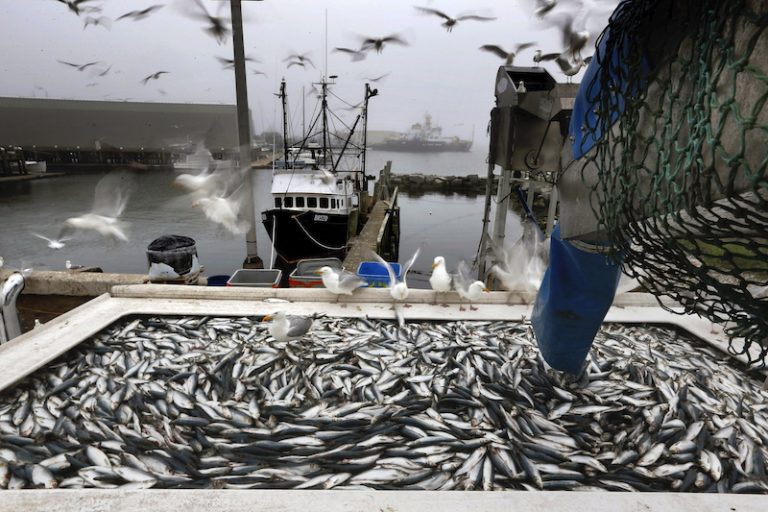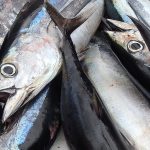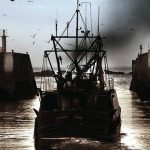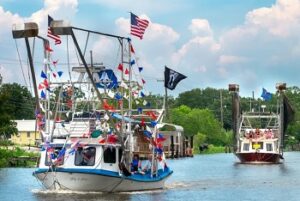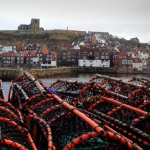Tag Archives: commercial fishing
N.C. Sea Grant Programs try to aid industry
![]() When it comes to the future of commercial fishing, for Warren Judge, Outer Banks Catch chairman, the current commercial fishing regulations, with strict limits and season closures, are the biggest concern. Mr. Judge said if the industry stays on “the current course of regulatory strangulation, the future looks bleak.” “But I’ve got to believe that working with our elected officials, we can make them see commercial fishing creates jobs and is important to North Carolina heritage,” he said. continue
When it comes to the future of commercial fishing, for Warren Judge, Outer Banks Catch chairman, the current commercial fishing regulations, with strict limits and season closures, are the biggest concern. Mr. Judge said if the industry stays on “the current course of regulatory strangulation, the future looks bleak.” “But I’ve got to believe that working with our elected officials, we can make them see commercial fishing creates jobs and is important to North Carolina heritage,” he said. continue
New Protections for White Shark Effective March 1
![]() White sharks off California’s coast will receive additional protection beginning March 1, the date it becomes a candidate species under the California Endangered Species Act (CESA). Read more here
White sharks off California’s coast will receive additional protection beginning March 1, the date it becomes a candidate species under the California Endangered Species Act (CESA). Read more here
Feds see early signs of Pacific fishery recovery
 HALF MOON BAY, Calif. (AP) – After one of the West Coast’s most valuable commercial fisheries was declared an economic disaster in 2000, California and other Pacific states saw more boats being sold and more fishermen looking for work. Read more here
HALF MOON BAY, Calif. (AP) – After one of the West Coast’s most valuable commercial fisheries was declared an economic disaster in 2000, California and other Pacific states saw more boats being sold and more fishermen looking for work. Read more here
New England – Drastic Cuts to Imperiled Cod Fishery
 Rip Cunningham, chairman of the New England Council, told the Gazette this week it was a difficult process. “I continue to think it was a tough decision to make,” he said. “Given the circumstances, I think the council made the right decision. The council understands that when they make their decision there are real people that are going to be impacted. I certainly hope everyone is thinking that we have to do a balance between mitigating short-term impacts to the fishermen and the long-term impacts to the resource.” Read more here
Rip Cunningham, chairman of the New England Council, told the Gazette this week it was a difficult process. “I continue to think it was a tough decision to make,” he said. “Given the circumstances, I think the council made the right decision. The council understands that when they make their decision there are real people that are going to be impacted. I certainly hope everyone is thinking that we have to do a balance between mitigating short-term impacts to the fishermen and the long-term impacts to the resource.” Read more here
Drastic groundfishing cuts approved by fishery management agency
UPDATE… 6:27 PM Wed. New England Fisheries Management Council recommends cutting Cod fishing limits in the Gulf of Maine by 77% and in George’s Bank by 55%. This is critical, fisherman say, because catching cod leads to catching other fish like haddock. They say the cuts are devastating. Watch video
Keep the Fishing Ban in New England – CALLUM ROBERTS, YORK, England
![]() Where were the regulators through all of this? Always one step behind and perennially ineffective. Federal law delegated to the New England Fishery Management Council authority to manage the fishery from 3 miles to 200 miles off the coast, but the council didn’t see its job as speaking up for fish. This body was dominated by fishing interests, so when faced with a choice of fishing now or cutting back the catch to assure the fishery’s future, the council’s decisions often favored the short term. With such decisions, collapse of the fishery was inevitable. When it happened in the late 1980s, it was brutal and swift. By the early 1990s, all agreed that something had to be done. The council reinvented its approach to fishery management.Read more
Where were the regulators through all of this? Always one step behind and perennially ineffective. Federal law delegated to the New England Fishery Management Council authority to manage the fishery from 3 miles to 200 miles off the coast, but the council didn’t see its job as speaking up for fish. This body was dominated by fishing interests, so when faced with a choice of fishing now or cutting back the catch to assure the fishery’s future, the council’s decisions often favored the short term. With such decisions, collapse of the fishery was inevitable. When it happened in the late 1980s, it was brutal and swift. By the early 1990s, all agreed that something had to be done. The council reinvented its approach to fishery management.Read more
Outer Banks Watermen call for emergency action on inlet
Men and women employed in the commercial fishing, charter boat and boat building industries on the Outer Banks lined the perimeter of the Dare County Board of Commissioners meeting room at the board’s Jan. 7 meeting, waiting for their opportunity to speak during public comment. Read more
Winter tough on many levels for local fishing fleet – Eric Anderson
Those committed to the profession still contribute greatly to this local economy with their spending, which make them an integral and longstanding participant in this community. Regardless of how fast changes are taking place, communit ies need to be careful not to lose their founding industries that add so much to the local identity. I hope that most might agree the fishing industry presents a positive component of our community that needs attention and elevated exposure, considering the variety of challenges that it endures. Read more
ies need to be careful not to lose their founding industries that add so much to the local identity. I hope that most might agree the fishing industry presents a positive component of our community that needs attention and elevated exposure, considering the variety of challenges that it endures. Read more
Guest View: The end of “overfishing”? By Dr.Brian J. Rothschild (new england trusted)
Brian J. Rothschild is the Montgomery Charter professor of Marine Science and Technology at the UMass Dartmouth School for Marine Science and Technology.
The necessity of imposing the cuts is not clear. The council’s scientific committee has had difficulties reaching consensus on the management of key stocks. The Council is faced with a dilemma. If the stocks are down and the cuts are necessary, how do we mitigate the impact of the cuts on the people who work in the fishing industry and fishing communities, and then how do we plan for the future? At the same time, if the stocks are not down and the cuts are not necessary, how do we promote stability within the fishing industry and fishing communities, and then how do we plan for the future?
To understand the council’s short- and long-range plans on how to deal with its dilemma is crucial, particularly since the condition of the groundfish stocks may not be as bad as it seems. Read More
Closed Areas need fed’s OK to open
 The New England Fishery Management Council has voted to recommend giving commercial groundfishermen access to parts of five areas that have been closed to them for many years. The request to open closed areas to commercial fishing came days before the NOAA Science Center issued a report on the 2011 fishing year that contained the revelation that only 41 percent of allocated fish were landed in 2011. Read More
The New England Fishery Management Council has voted to recommend giving commercial groundfishermen access to parts of five areas that have been closed to them for many years. The request to open closed areas to commercial fishing came days before the NOAA Science Center issued a report on the 2011 fishing year that contained the revelation that only 41 percent of allocated fish were landed in 2011. Read More
Alaska – Better alternatives to fisheries observer program story – dwarfed by the public comment!
The North Pacific Fishery Management Council (NPFMC) recently approved a restructured observer program that extends observer coverage to Alaska’s small boat fleet. With the National Marine Fisheries Service (NMFS) taking over observer deployment, the industry-funded restructured program increases the cost of an observer day from the current $400 to approximately $1,000.
The Great King Salmon Mystery – You may be wondering why you failed to that king salmon this year? Some are calling it a king salmon crisis but few if any will attempt to answer the mysterious question as to where all of our king salmon have gone to. It’s not a salmon crisis when your neighbor fails to catch a king, it’s a crisis when you fail to catch one. If you ask the Alaska Department of Fish & Game, they will claim that our freshwater rivers and streams are producing plenty of baby king salmon. The mystery…. Read More
Your View: Fishery council must reject unreliable assessments – By Richard Canastra – southcoasttoday
I nearly always attend New England Fishery Management Council meetings in person, but last month, I was unable to attend the meeting in Newport, and instead listened to the proceedings online. I found that listening, and not physically being there, gives you a different perspective on a meeting. You hear more intently. There are fewer distractions. Examples seem clearer. Patterns emerge. There are some predictable patterns in life. When there is an accident, at the end of the traffic jam you find a police officer. When you go to a restaurant, at the end of dinner the bill comes. And when you attend a fisheries management council meeting that is dealing with a crisis, there is usually a bad stock assessment.
Bad stock assessments have become as predictable as the sunrise. Read More
Share and Share Alike
As a citizen advocate of the fishing industry, I have no confidence in NOAA stock assessments.
I spend a lot of time reviewing material, attempting to convey the results to as many people possible.
These listening sessions allow, as Mr Canastra stated, patterns to emerge.
The patter of Bill Karp, and Sam Rauch deviates not from the typical bureaucratic structure, much to my disappointment after listening to them from various venues, and reading a lot of information.
The revelations of the Georges Bank Yellowtail Flounder Working Group Meeting May 23, 2012, are the foundation of my opinion to condemn the stock assessments as a tool for fishery management, while enforcing Mr Canastras belief that the proper equipment is not being utilized to sample yellow tail flounder abundance.
As stated, patterns have emerged. The pattern of over looking details that have detrimental affects on stock assessments and confidence in them.
At the The New England Fishery Management Council’s three-day meeting in Plymouth Ma on 9/25/2012, a major detail confirmed the retrospective patter of no confidence in stock assessments conducted by NOAA.
During the 54th Stock Assessment Workshop (SAW)/Stock Assessment Review Committee (SARC) Meetings, a fisherman asked a question that received a hollow shrug of the shoulders answer that I find alarming, and telling that these assessments are substandard and incomplete.
The question was, “why is there no mention of herring as a predator species” in the ground fish assessment?
The answer. ” The SSC was, ah, not presented, ah, ah herring as a, ah, predator species….”
Yes. A Retrospective Pattern of the science used to mismanage this industry is established.
No confidence.
NOAA region chief Bullard hedges on interim limits
The coalition theory was based on an interpretation of the Magnuson-Stevens Act for building a second year of relief — “reducing” rather than “ending” overfishing — while a plan to bring the stock to maximum sustainable yield is crafted.,“I’m not going to opine on whether you can squeeze another year out of (the Magnuson regulations),” Bullard said in a Thursday interview at the Times. “We’re willing to take a look at this at the meeting.” Read More
Commerce secretary: Return $544K in fish fines – Bloomberg
BOSTON (AP) — The acting U.S. Commerce Secretary on Friday ordered federal regulators to return about $544,000 in unjust fines collected from 14 fishermen or fishing businesses, most of whom worked Northeast waters. New Bedford fishing boat owner Carlos Rafael, who will receive $17,500 back after Blank’s order, said he’s pleased to get anything, given the industry’s ongoing struggles. But he said the bigger victory is accountability for fisheries’ officers. “Even if I didn’t get any money, the world is watching them,” he said. “Before nobody was watching them. … Before they were like the Gestapo. Before you were (automatically) guilty, the party was over.” http://www.businessweek.com/ap/2012-12-14/commerce-secretary-return-544k-in-fish-fines
Salt of the Sea Video Trailer
Filmed aboard several independently owned/operated commercial fishing boats in the Northeast, Salt of the Sea juxtaposes the working fishermen’s perspective on regulations with key players in Federal fishery management. Topics include NOAA’s lost $48 million scandal, inaccurate Cod fish quotas, and overzealous enforcement. http://www.saltofthesea.tv/salt-of-the-sea-trailer.html www.facebook.com/saltofthesea
Southeast Alaska Seiners Struggling With Salmon Observer Program
EPA grant to fund sea lamprey testing. Lamprey threaten both the ecosystem and commercial fishing in the Great Lakes
LANSING — A $392,000 Environmental Protection Agency grant will pay for testing sea lamprey repellent on three to-be-named spawning streams in the state. The project is expected to be completed within the 10 years the EPA requires.
Sea lamprey are attracted to the smell of their young and repulsed by the stench of their dead, said Michael Wagner, lead researcher on the project and an assistant professor of fisheries and wildlife at Michigan State University. http://record-eagle.com/statenews/x1839360630/EPA-grant-to-fund-sea-lamprey-testing
Managing Our Nation’s Fisheries 3: Advancing Sustainability
The purpose of this conference is to elevate the discussion of current, developing concepts on the sustainability of United States marine fishery management, towards possible future use in improving contemporary practices. The conference will examine three theme areas, each of which focuses on policy, science, and process issues associated with three germane topic areas of high current interest. Findings that emerge from this national conference regarding advancing sustainable fishery management practices could be considered for changes to current policy or regulatory approaches developed at Regional Fishery Management Councils or implemented by the National Marine Fisheries Service, or legislative changes via reauthorization of the Magnuson –Stevens Act, as appropriate. http://www.managingfisheries.org/index7.htm
Rep. Antonio F.D. Cabral-Fishing industry needs research money as well as disaster relief
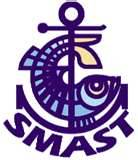 The elections may be over, but the current Congress still has work to do…..We need reliable, independent science. And Massachusetts is best equipped to provide it….That’s because there has not been adequate, sustained funding for independent research centers…..environment using scientific evidence that is, by its own scientists’ admission, often unspecific, unproven and unreliable. NOAA has been put in the position of acting not only as judge and jury, but as prosecution, defense and expert witness…..In particular, the School for Marine Science and Technology (SMAST) at UMass Dartmouth is uniquely suited to provide this research. SMAST has an ideal location as well as a history of fostering positive collaboration between all fishing stakeholders. SMAST can also boast a proven record of success in fishery research. In the 1990s the scallop industry was on the verge of collapse when SMAST pioneered new research on a very tight budget that proved the scallop population wasn’t devastated, http://www.southcoasttoday.com/apps/pbcs.dll/article?AID=/20121118/OPINION/211180303
The elections may be over, but the current Congress still has work to do…..We need reliable, independent science. And Massachusetts is best equipped to provide it….That’s because there has not been adequate, sustained funding for independent research centers…..environment using scientific evidence that is, by its own scientists’ admission, often unspecific, unproven and unreliable. NOAA has been put in the position of acting not only as judge and jury, but as prosecution, defense and expert witness…..In particular, the School for Marine Science and Technology (SMAST) at UMass Dartmouth is uniquely suited to provide this research. SMAST has an ideal location as well as a history of fostering positive collaboration between all fishing stakeholders. SMAST can also boast a proven record of success in fishery research. In the 1990s the scallop industry was on the verge of collapse when SMAST pioneered new research on a very tight budget that proved the scallop population wasn’t devastated, http://www.southcoasttoday.com/apps/pbcs.dll/article?AID=/20121118/OPINION/211180303










































